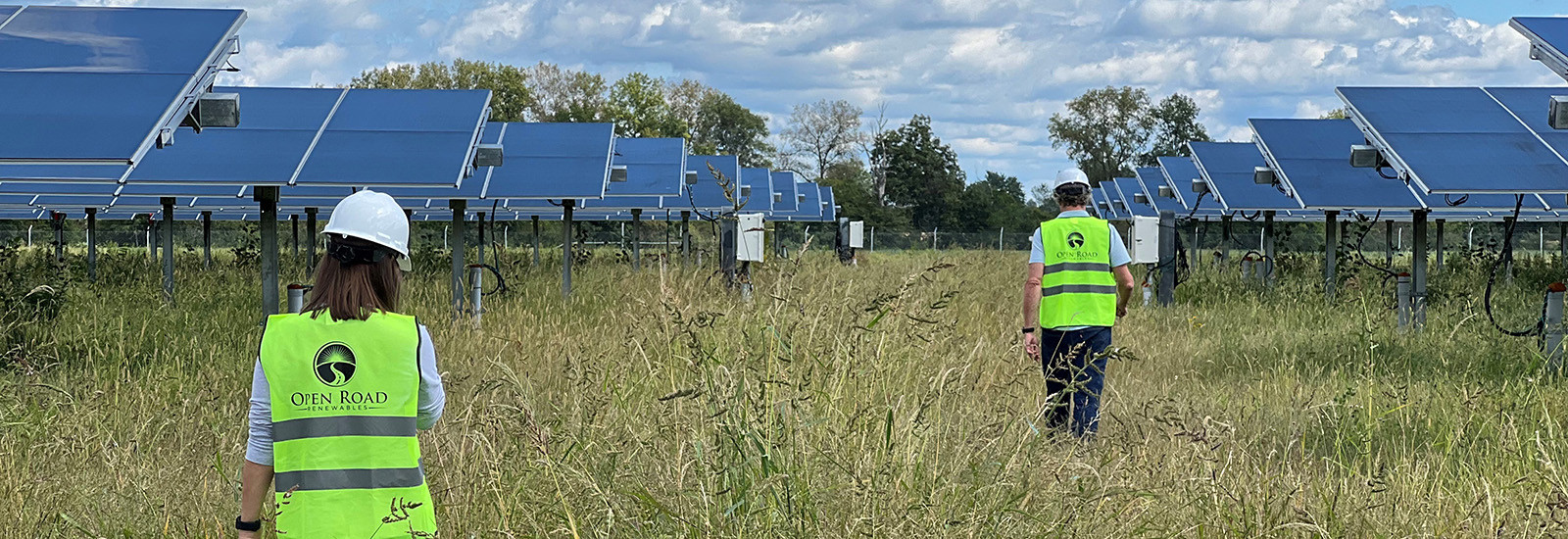A first-time gift from solar developer Open Road Renewables, LLC, (ORR) is helping a cohort of graduate students studying sustainable energy at The Ohio State University to explore the many dimensions of energy development from place-based impacts to social justice.
“Power affects everyone, but it affects everyone differently,” said Doug Herling, Vice President at ORR. Herling works with landowners and grid operators to advance new solar projects to the point of construction. Landowners can have many understandable concerns including the conversion of land to renewable energy production, safety, and the impact on viewsheds. It’s important to approach conversations with local communities about renewable energy development holistically and resist the temptation to just “check the box on clean energy,” Herling emphasizes. “Solar development is changing every day. The projects being designed today look different from those designed five years ago.”
Gaining a better understanding of how new solar projects can be installed on farmlands that continue agricultural production – an emerging field known as “agrivoltaics” – is what led ORR to donate $100,000 to support student trainees enrolled in Ohio State’s EmPOWERment Program.
The EmPOWERment Program was launched in 2020 as a result of a grant from the U.S. National Science Foundation with the goal of training emerging sustainable energy innovators from among Ph.D. students enrolled at Ohio State. The program provides students with the opportunity to pursue interdisciplinary training in energy-systems and technologies, social and community effects, data science, energy policy, natural resources, business, and law, among other topics, to address the challenges of transitioning to a low-carbon energy future. Applying this coursework to real-world issues, such as ORR’s agrivoltaic projects in Ohio, makes the learning experience more tangible and multi-faceted.
“Students report having a better learning experience when they are exposed to a topic through multiple disciplines,” says Jeffrey M. Bielicki, principal investigator and director of the EmPOWERment Program. Bielicki understands firsthand the value of studying an issue like energy from different perspectives. He holds a joint appointment at Ohio State with the College of Engineering and with the John Glenn College of Public Affairs. “Energy development does not advance only on a technological level,” he explains. “It is highly influenced by policy considerations and local community desires.”
Bielicki adds that “an important goal for Ohio State’s EmPOWERment Program is to reach students with backgrounds that have been historically underrepresented in STEM and energy-related fields.” He points out that “power” not only means energy but also the position of one group of people compared to another. The EmPOWERment Program seeks to bridge these gaps when it comes to developing the next generation of sustainable energy leaders. “The future of sustainable energy is an inclusive one that needs to involve groups that have not always had a seat at the table,” Bielicki says.
For Herling and ORR, partnering with the EmPOWERment Program is not only an opportunity to “pay-it-forward” by providing a unique learning experience to the trainees, it might also yield valuable insights into the company’s own projects. The company has posed two challenge statements with practical applications in Ohio for the students to research this academic year: (1) understanding the impacts to watersheds from transitioning cropland to a solar facility and (2) how the development of a vegetation management plan for a solar facility can contribute to erosion control, provide forage options for grazing, and enhance other ecological benefits. The research is expected to demonstrate how a solar development can benefit a farming community as well as areas where steps can be taken to address unintended consequences.
The partnership with ORR is expected to make a difference for Samuel Copeland, an environmental engineering Ph.D. student. Copeland says he enrolled in the EmPOWERment Program for a few reasons. He wanted to better understand the nexus between energy and policy, especially the interplay between the two. He also wanted to become more comfortable speaking on topics related to power, clean energy, and sustainability. Perhaps the biggest motivation, however, is to learn about the disparities in energy accessibility among different areas and groups of people. After completing the initial coursework, Copeland has focused on making geospatial maps with the goal of finding places to add or improve solar energy.
Copeland is excited about the learning opportunity created by ORR and encourages other Ph.D. candidates to enroll in the EmPOWERment Program. He succinctly sums up the value proposition for the training. “It is important to think interdisciplinary.”
The EmPOWERment Program is currently accepting applications for the 2024-25 academic year.
Story by Reily Jacobs Bell, student communications intern.
Story image used with permission from Open Road Renewables, LLC.
